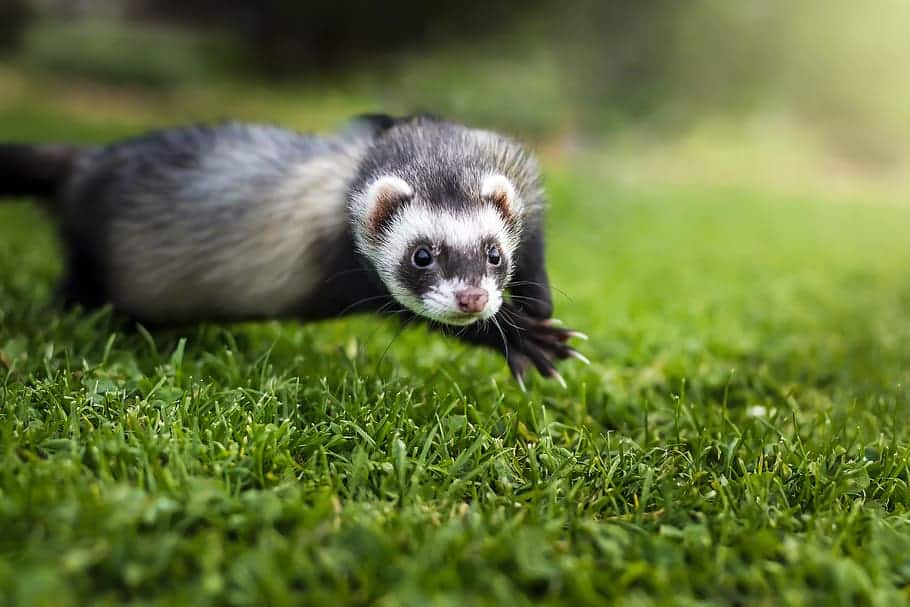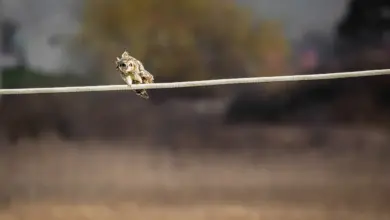Ferret Pawing at Mouth: Top Reasons and Solutions to This Common Behavior
Ferret Pawing at Mouth
Ferrets are curious and playful creatures that make excellent pets for the right person. However, like all animals, they may exhibit certain behaviors that signal potential health issues.
One such behavior is pawing at their mouth, which can be a cause for concern among ferret owners.
Pawing at the mouth can be indicative of various health problems in ferrets. These issues may range from low blood sugar, nausea caused by insulinomas, to other more serious conditions.
Understanding the potential causes of this behavior and seeking proper veterinary care can help ensure the well-being of these fascinating animals.

Ferret Behavior Basics
Ferrets are curious and social creatures that exhibit a variety of unique behaviors. Understanding these behaviors can foster a positive relationship with your ferret and help you identify any potential issues.
Communication Signals
Ferrets communicate with each other and their human companions through a series of physical and vocal cues. Vocalizations include soft squeaking or hissing when scared, angry, or threatened.
They may also display behaviors such as pawing at the mouth, which can indicate nausea or low blood glucose, particularly in ferrets older than three years of age.
In addition, ferrets may exhibit a “reverse sneeze” or “choking” sound to clear foreign material from their throat. This normal behavior is often mistaken for a serious problem, but it typically stops within a few seconds and occurs occasionally on a daily basis (Animal Humane Society).
Ferrets also have expressive body language that conveys their emotions. A poofed-out tail and frenzied hopping can signify stress, while anger and fear may result in hissing and a defensive posture.
Establishing a strong bond and understanding your ferret’s communication signals will lead to a more enjoyable and healthy relationship with your pet. Recognizing these signals early on can help prevent unnecessary stress and provide preventative care when needed.

Reasons Behind Pawing at Mouth
When ferrets paw at their mouths, it can be due to several reasons. In this section, we will explore three common causes which include dental problems, foreign objects, and allergies.
Dental Problems
Just like humans, ferrets can experience dental issues such as tooth decay, gingivitis, and periodontal disease.
When a ferret suffers from dental problems, it may cause discomfort and pain, leading to the pawing behavior.
Regular dental check-ups with a veterinarian experienced in ferret care are essential for maintaining good oral health.
Foreign Objects
Ferrets are curious creatures, and their curiosity can sometimes lead them to chew on or ingest foreign objects that can become lodged in their mouth or digestive tract.
This can cause discomfort and potentially lead to more severe issues if not addressed promptly.
Examples of foreign objects that may be ingested by a ferret include parts of toys, small household items, or food debris.
When a foreign object is lodged in a ferret’s mouth or digestive tract, it may cause symptoms such as loss of appetite, nausea, vomiting, or black tarry stools.
Allergies
Although less common, ferrets can also experience allergies. Allergies in ferrets may manifest as skin irritations, itchiness, and inflammation of the mouth and gums.
In such cases, a ferret may paw at its mouth in an attempt to relieve the discomfort. Identifying the cause of the allergy and providing appropriate treatment is crucial for managing this issue.
A veterinarian may prescribe medication or recommend changes in diet, environment, or grooming practices to help alleviate the symptoms associated with allergies.

How to Address the Issue
When dealing with a ferret pawing at its mouth, a pet owner should take specific steps to address this concern.
This section will discuss various methods, including home inspection and seeking veterinary assistance.
Home Inspection
First, a ferret owner should perform a basic inspection of the ferret’s environment and behavior.
This includes looking for possible injuries or obstructions in the pet’s mouth, checking the ferret’s living conditions, and ensuring they have access to adequate food and water.
Additionally, it’s helpful to observe the ferret’s behavior for any changes or signs of distress, such as excessive drooling or difficulty eating.
Maintaining a clean and safe environment for the ferret is crucial, as it can help prevent potential health problems.
Check the ferret’s bedding and living area for any hazards, such as sharp objects or toxic substances.
Providing chew toys and proper diets can also help prevent dental issues, which could cause a ferret to paw at its mouth.
Seeking Veterinary Assistance
If home inspection methods do not resolve the issue or the ferret’s condition worsens, it is essential to seek veterinary assistance promptly.
A veterinarian will examine the ferret to determine the cause of the problem, which could range from dental disease to more serious issues such as insulinoma, resulting in low blood sugar and nausea2.
In some cases, a veterinarian may prescribe medications, recommend dietary changes, or suggest other treatments to address the issue. It is crucial to follow the vet’s instructions closely and monitor the pet’s progress regularly.
This proactive approach can help ensure the ferret receives the best possible care, allowing it to live a healthy, comfortable life.
Preventative Measures
Oral Hygiene
Maintaining proper oral hygiene is crucial for preventing ferrets from pawing at their mouths. Regular brushing of your ferret’s teeth with a special toothpaste and brush designed for pets can help remove plaque, reduce tartar buildup, and avoid dental problems. A dental care routine should ideally include:
- Brushing your ferret’s teeth daily or at least 2-3 times a week
- Scheduling annual dental check-ups with a veterinarian
- Providing chew toys designed for oral health to help with cleaning
It’s essential to monitor your ferret for signs of dental issues, such as bad breath, swollen gums, or excessive drooling, and consult a veterinarian if any are noticed.
Safe Environment
Creating a safe environment for your ferret can reduce the risk of injuries that could cause them to paw at their mouth. This includes:
- Regularly inspecting your ferret’s toys and cage for any sharp or damaged parts that could cause injury.
- Providing a clean and tidy habitat to minimize the risk of infection from foreign objects in their surroundings.
- Observing your ferret’s behavior and removing any problematic items they tend to chew on or ingest that could cause harm
Supervision is also crucial, especially during playtime, to ensure your ferret is not engaging in potentially harmful activities, such as chewing on electrical cords or ingesting hazardous substances.
Implementing these oral hygiene practices and maintaining a safe environment for your ferret can significantly reduce the chances of your pet pawing at its mouth and prevent various health complications.
Monitoring Your Ferret’s Health
Regularly monitoring your ferret’s health is crucial to ensure their well-being. Observing for any signs of discomfort, such as pawing at the mouth, can help identify potential health issues.
When a ferret paws at its mouth, it might indicate an irritant or discomfort in the oral or gastrointestinal area.
For instance, one reason for drooling and pawing at the mouth may be related to glucose levels. Maintaining proper glucose levels is vital for a ferret’s health, as they can affect overall behavior and well-being.
Routine blood glucose tests can help determine if your ferret is experiencing any issues in this regard.
Other potential causes of discomfort might involve ulcers and gum diseases. Treatments such as Sucralfate (carafate) can help relieve irritation by forming a protective coating over ulcers and soothe the stomach lining.
Ferret owners should regularly check for changes to the color of their ferret’s gums, lips, or nose, as pale or white coloration suggests anemia, while yellowing can signify liver damage or disease.
Beyond observing for signs of discomfort, ensure your ferret’s overall health by:
- Trimming their claws regularly without cutting the dark vein visible in each claw. In case of accidental cuts, applying styptic powder can stop the bleeding.
- Monitoring for changes in urine color, as it can indicate health issues like heartworms, anemia, or a bladder infection. For example, yellow urine turning green can be a sign of a potential problem.
- Examining your ferret’s behavior and tracking any abnormal patterns or sudden changes. Keep alert for symptoms such as excessive drooling, twitching, shaking, or being unresponsive, which might signal insulinoma, a life-threatening disease in ferrets.
By diligently observing your ferret’s behavior, appearance, and overall well-being, you can gain valuable insights into their health, address issues promptly, and ensure they lead a comfortable and happy life.



